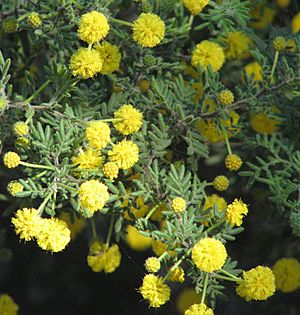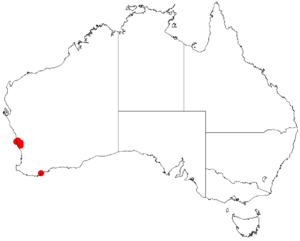Acacia plicata facts for kids
Quick facts for kids Acacia plicata |
|
|---|---|
 |
|
| Conservation status | |
| Scientific classification | |
| Genus: |
Acacia
|
| Species: |
plicata
|
 |
|
| Occurrence data from AVH | |
| Synonyms | |
|
Racosperma plicatum |
|
Acacia plicata is a special kind of wattle plant. It is a type of shrub that only grows in a specific part of Western Australia. You can find it between the cities of Perth and Geraldton.
What it Looks Like
This plant is a shrub that can stand straight up or have drooping branches. It usually grows to be about 0.9 to 2 meters (3 to 6.5 feet) tall. Its flowers are bright yellow and shaped like small balls. They bloom from late winter to mid-spring.
The leaves of Acacia plicata are a bit hairy. They are called "bipinnate," which means they are divided into smaller leaflets. These leaflets are long and narrow, about 1.5 centimeters (0.6 inches) long. The round flower heads grow on thin stems that are about 2.5 centimeters (1 inch) long. After the flowers, the plant forms a unique seed pod. This pod is about 2 centimeters (0.8 inches) long and has clear folds or pleats.
How it is Classified
A botanist named Bruce Maslin first officially described Acacia plicata in 1975. Botanists are scientists who study plants. He wrote about it in a science paper called Studies in the genus Acacia (Mimosaceae) - A Revision of Series Pulchellae. This paper was published in a journal called Nuytsia.
For a while, this plant also had another scientific name: Racosperma plicatum. This name was given by Leslie Pedley in 2003. However, Acacia plicata is the name that is used today.
Where it Grows
Acacia plicata is found mainly around a place called Dandaragan. This area is in the Mid West region of Western Australia. It likes to grow in soils that are made of loamy soil and clay. Often, these soils are found over sandstone or siltstone. You can commonly see it growing along drainage lines, which are small paths where water flows.
This wattle often grows near water in forests. It is part of the plants that grow under taller trees. These taller trees are usually Eucalyptus wandoo and Eucalyptus loxophleba trees.
Growing This Plant
If you want to grow Acacia plicata from seeds, you need to prepare them first. This process is called scarification. It means you need to scratch the seeds or treat them with boiling water. This helps the seeds sprout. Once it grows, this plant is good at handling dry weather (drought) and cold temperatures (frost).
See also
 In Spanish: Acacia plicata para niños
In Spanish: Acacia plicata para niños
 | Tommie Smith |
 | Simone Manuel |
 | Shani Davis |
 | Simone Biles |
 | Alice Coachman |


